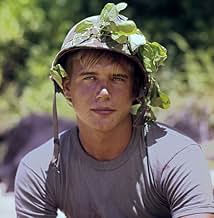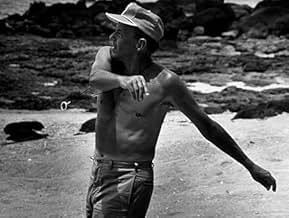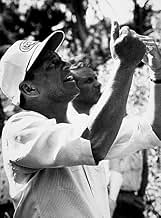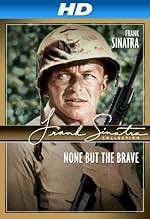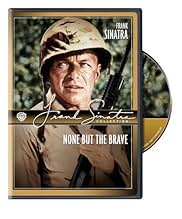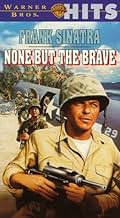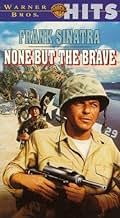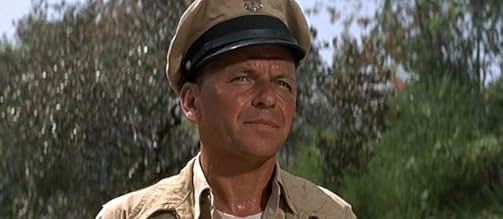NOTE IMDb
6,4/10
2,2 k
MA NOTE
Ajouter une intrigue dans votre langueDuring WW2, a platoon of Marines crash-lands on a tiny Pacific island occupied by a small Japanese unit.During WW2, a platoon of Marines crash-lands on a tiny Pacific island occupied by a small Japanese unit.During WW2, a platoon of Marines crash-lands on a tiny Pacific island occupied by a small Japanese unit.
- Réalisation
- Scénario
- Casting principal
Takeshi Katô
- Sgt. Tamura
- (as Takeshi Kato)
Tôru Ibuki
- Pvt. Arikawa
- (as Toru Ibuki)
Ryûchô Shumpûtei
- Pvt. Okuda
- (as Ryucho Shunputei)
Avis à la une
When you get right down to it, war is a pointless human endeavor. All it causes is death and destruction. When we use war to achieve a right event (such as the defeat of Nazism in World War II), it was often avoidable had some other peaceful action been taken earlier. Proper, humane treatment of Germany after World War I may have prevented the outbreak of World War II. "None But the Brave" is an earnest attempt to show that the differences between men in war can often be settled peacefully, and working together for mutual survival often assures peace and serenity.
The plot of the movie is rather straightforward. A plane carrying about a dozen American soldiers crashes on a small Pacific atoll, where the remnants of a Japanese garrison have been all but forgotten by their superiors. About equal in numbers, the two opposing parties attempt to fight it out, but then realize the hopelessness of confrontation, and instead form a peace in order to share fresh water, food, and medical supplies.
The two leads, Clint Walker ("The Dirty Dozen") and Tatsuya Mihashi ("Tora! Tora! Tora!") both shine in their roles. The two men are parallels: both have a sense of patriotism and devotion to their nation and the men under their command, yet both are humanists who see no point in destruction. During the truce, the two form a true friendship, coming to understand their respective backgrounds and personal life stories with respect and admiration for each other.
The supporting cast is generally filled with clichéd, familiar characters (a tough sergeant, a grizzled corporal, some inexperienced grunts, etc.), but the story really isn't about them. Tommy Sands ("The Longest Day") plays a green lieutenant out for blood, and his acting is far over the top. There's a story behind this, and it's unfortunate that his delivery strongly distracts from the story. Frank Sinatra has little to do, as he was busy in the director's chair, but there is a great extended scene revolving around a leg amputation where his limited dialog and great facial expressions more than deliver the goods. When Sinatra had substantial screen time, he used it well, but unfortunately he didn't give himself enough to do and his character is basically a waste of energy.
Director of Photography Harold Lipstein ("Hell is for Heroes") does a fantastic job with the Pacific locations. The steamy tropical jungle truly comes alive, especially during a fabulous scene in which a monsoon sweeps over the island. Sinatra's direction lacks flair, and most of the action sequences are straightforward and bland. The firefight revolving around a Japanese boat is also grim and gritty; and the final confrontation between the Japanese and Americans really delivers, mostly because of the blatant anti-war message which comes about 30 seconds after the shooting stops.
The movie features a rather boring score by John Williams (who was just starting to break into writing film scores in 1965; most of his work had been in television prior to this film). Eiji Tsuburaya (of "Godzilla") fame supervised the special effects work, and unfortunately, I have always found his work below-par when compared to some of the innovations Hollywood could afford during this period. There's a scene in which two model planes on strings blast away at each other in the same manner toy airplanes fired rockets at monsters as they attacked Tokyo. I can understand the Japanese cast and crew, since this was a joint production, but someone else should have been running the special effects department.
These are just minor nitpicks. Sinatra does a very good job directing this film and he has taken far too much criticism from other reviewers. The statements made in this film are bold and honest, and there are many moving moments. The final act is a brilliant exercise depicting the waste and futility of war. If everyone could not only watch, but understand the philosophy portrayed in this movie, perhaps the world would be a more peaceful place.
The plot of the movie is rather straightforward. A plane carrying about a dozen American soldiers crashes on a small Pacific atoll, where the remnants of a Japanese garrison have been all but forgotten by their superiors. About equal in numbers, the two opposing parties attempt to fight it out, but then realize the hopelessness of confrontation, and instead form a peace in order to share fresh water, food, and medical supplies.
The two leads, Clint Walker ("The Dirty Dozen") and Tatsuya Mihashi ("Tora! Tora! Tora!") both shine in their roles. The two men are parallels: both have a sense of patriotism and devotion to their nation and the men under their command, yet both are humanists who see no point in destruction. During the truce, the two form a true friendship, coming to understand their respective backgrounds and personal life stories with respect and admiration for each other.
The supporting cast is generally filled with clichéd, familiar characters (a tough sergeant, a grizzled corporal, some inexperienced grunts, etc.), but the story really isn't about them. Tommy Sands ("The Longest Day") plays a green lieutenant out for blood, and his acting is far over the top. There's a story behind this, and it's unfortunate that his delivery strongly distracts from the story. Frank Sinatra has little to do, as he was busy in the director's chair, but there is a great extended scene revolving around a leg amputation where his limited dialog and great facial expressions more than deliver the goods. When Sinatra had substantial screen time, he used it well, but unfortunately he didn't give himself enough to do and his character is basically a waste of energy.
Director of Photography Harold Lipstein ("Hell is for Heroes") does a fantastic job with the Pacific locations. The steamy tropical jungle truly comes alive, especially during a fabulous scene in which a monsoon sweeps over the island. Sinatra's direction lacks flair, and most of the action sequences are straightforward and bland. The firefight revolving around a Japanese boat is also grim and gritty; and the final confrontation between the Japanese and Americans really delivers, mostly because of the blatant anti-war message which comes about 30 seconds after the shooting stops.
The movie features a rather boring score by John Williams (who was just starting to break into writing film scores in 1965; most of his work had been in television prior to this film). Eiji Tsuburaya (of "Godzilla") fame supervised the special effects work, and unfortunately, I have always found his work below-par when compared to some of the innovations Hollywood could afford during this period. There's a scene in which two model planes on strings blast away at each other in the same manner toy airplanes fired rockets at monsters as they attacked Tokyo. I can understand the Japanese cast and crew, since this was a joint production, but someone else should have been running the special effects department.
These are just minor nitpicks. Sinatra does a very good job directing this film and he has taken far too much criticism from other reviewers. The statements made in this film are bold and honest, and there are many moving moments. The final act is a brilliant exercise depicting the waste and futility of war. If everyone could not only watch, but understand the philosophy portrayed in this movie, perhaps the world would be a more peaceful place.
There's a clumsiness to 1965's "None But The Brave" that you really shouldn't let get in your way of the film. The clumsiness is due to Frank Sinatra's direction -- he was a far, far better actor than a director, and wisely chose never to direct another film -- and it exposes itself most prominently in the film's heavy-handed "flashback" sequences.
Having gotten that out of the way, let's consider the film itself. World War II, a small island in the Pacific: a group of marooned GIs find themselves sharing space with an equally marooned group of Japanese soldiers. Reluctantly, a truce evolves; each side has something the other needs. During that truce, enemies develop -- if not a true friendship -- at least an understanding, an empathy, and a respect for, each other. This truce, of course, cannot endure. The outside world -- and the war -- must impose itself, and each side reacts according to its own sense of honor and duty. Rightly so.
Some reviewers have chosen to label this an 'anti-war' film. Perhaps it is. Myself, I prefer to think of it, rather, as a 'pro-humanity' film, one which recognizes that man will pit himself against man time and time again, and for reasons that may or may not be the best, but that -- in the end -- we can, each of us, even in the midst of the most horrific conflict imaginable, step away, even if only for the briefest of moments (or truces), and deal with each other as human beings.
That's what happens in "None But The Brave."
And if the ending is less than satisfactory, maybe it serves to makes us each wish for a better one . . . and a better world!
Having gotten that out of the way, let's consider the film itself. World War II, a small island in the Pacific: a group of marooned GIs find themselves sharing space with an equally marooned group of Japanese soldiers. Reluctantly, a truce evolves; each side has something the other needs. During that truce, enemies develop -- if not a true friendship -- at least an understanding, an empathy, and a respect for, each other. This truce, of course, cannot endure. The outside world -- and the war -- must impose itself, and each side reacts according to its own sense of honor and duty. Rightly so.
Some reviewers have chosen to label this an 'anti-war' film. Perhaps it is. Myself, I prefer to think of it, rather, as a 'pro-humanity' film, one which recognizes that man will pit himself against man time and time again, and for reasons that may or may not be the best, but that -- in the end -- we can, each of us, even in the midst of the most horrific conflict imaginable, step away, even if only for the briefest of moments (or truces), and deal with each other as human beings.
That's what happens in "None But The Brave."
And if the ending is less than satisfactory, maybe it serves to makes us each wish for a better one . . . and a better world!
On a tiny forgotten island in the Pacific, there a tiny and forgotten Japanese outpost--with men who'd become stuck there with no great hope of rescue. Into this tiny place arrives a crashing airplane filled with US Marines. When they land, hostilities naturally break out between the groups. However, after a while they realize that killing each other will solve nothing and they have to work together to survive--forging an uneasy peace and friendship between enemy combatants.
NONE BUT THE BRAVE is a film that is a real product of the times. Had anyone wanted to make such a film in the 1940s, they might just have been strung up for the film's very unusual sensibilities. Unlike older war films, in this one the Japanese are humanized a great deal and it's obvious that the film was made during the anti-war 60s (though early in the anti-war years). In many ways, this is a good thing--showing that people on both sides could be decent. Though in some ways the whole thing seemed a bit hard to believe--after all, very, very few Japanese officers would have admitted to not having faith in the war--this was a very 1960s sentiment.
As for the acting, it was generally good. Clint Walker was clearly the star, though Frank Sinatra had a decent co-starring role in this film that he both produced and directed. The Japanese actors also were pretty good. The only weak point was the way Tommy Sands' character was written--he was like a one-dimensional caricature instead of a real soldier. No young lieutenant is THAT obnoxious and stupid!!
Overall, an entertaining film but one that strains credibility, as the concept behind the film just doesn't make much sense for the 1940s. Still, if you can stop those voices in your head from complaining about the plot, it's a good and very different movie.
NONE BUT THE BRAVE is a film that is a real product of the times. Had anyone wanted to make such a film in the 1940s, they might just have been strung up for the film's very unusual sensibilities. Unlike older war films, in this one the Japanese are humanized a great deal and it's obvious that the film was made during the anti-war 60s (though early in the anti-war years). In many ways, this is a good thing--showing that people on both sides could be decent. Though in some ways the whole thing seemed a bit hard to believe--after all, very, very few Japanese officers would have admitted to not having faith in the war--this was a very 1960s sentiment.
As for the acting, it was generally good. Clint Walker was clearly the star, though Frank Sinatra had a decent co-starring role in this film that he both produced and directed. The Japanese actors also were pretty good. The only weak point was the way Tommy Sands' character was written--he was like a one-dimensional caricature instead of a real soldier. No young lieutenant is THAT obnoxious and stupid!!
Overall, an entertaining film but one that strains credibility, as the concept behind the film just doesn't make much sense for the 1940s. Still, if you can stop those voices in your head from complaining about the plot, it's a good and very different movie.
Can circumstances turn bitter enemies fighting for their countries into true friends? None But the Brave attempts to answer this question with a unique look at the relationship between two companies of enemy soldiers during World War II. This 1965 film is a character study of the two groups one American, the other Japanese. Marooned together on an island, they are forced into a reluctant cease-fire in order to help each other survive.
Frank Sinatra plays Chief Pharmacist Maloney, an alcoholic medic. As always, `Ol' Blue Eyes' shines with his great performance, proving how incredibly underrated he is as an actor. His co-stars are Tatsuya Mihashi as Lieutenant Kuroki and Clint Walker as Captain Bourke. The poignant story is told from the perspective of Kuroki, the ranking Japanese soldier. Mihashi performs brilliantly as a man driven to honor his country, but in his heart carries deep hatred for violence and `admires men's works. not their destruction.' Walker's portrayal as Bourke, an American soldier haunted by his past, is outstanding. Kuroki and Bourke's positions are paralleled throughout the film as they struggle to keep their men under control in the middle of nowhere.
Sinatra was more than one of the film's stars. In a bit of multitasking, he also produced and displayed his directing skills in his only directorial endeavor. It is very apparent that the filmmakers tried extremely hard to display fair portrayals of both sides. For instance, there were three writers, Kikumaru Okuda and Katsuya Susaki, both Japanese, and John Twist, an American.
It was surprising that John Williams, credited as Johnny Williams, composed the musical score for this film. This was a rare opportunity to see just how much is skills have evolved since 1965, which of course is to be expected. While the music was entertaining, it did not reach the caliber of most of his soundtracks from around 1974 and up.
This was an excellent motion picture. It gets all points for writing and acting. The directing was quite good. My only criticism is that some of the action scenes could have been more dynamic. Sinatra apparently decided to use a very straightforward approach with the camerawork. This resulted in somewhat stagnant feel to the battle scenes where a slightly different angle would have made all the difference. This may have been on purpose, as this was not a typical shoot 'em up, drag 'em out war film, but had a much more intelligent story.
7 out of 10
Frank Sinatra plays Chief Pharmacist Maloney, an alcoholic medic. As always, `Ol' Blue Eyes' shines with his great performance, proving how incredibly underrated he is as an actor. His co-stars are Tatsuya Mihashi as Lieutenant Kuroki and Clint Walker as Captain Bourke. The poignant story is told from the perspective of Kuroki, the ranking Japanese soldier. Mihashi performs brilliantly as a man driven to honor his country, but in his heart carries deep hatred for violence and `admires men's works. not their destruction.' Walker's portrayal as Bourke, an American soldier haunted by his past, is outstanding. Kuroki and Bourke's positions are paralleled throughout the film as they struggle to keep their men under control in the middle of nowhere.
Sinatra was more than one of the film's stars. In a bit of multitasking, he also produced and displayed his directing skills in his only directorial endeavor. It is very apparent that the filmmakers tried extremely hard to display fair portrayals of both sides. For instance, there were three writers, Kikumaru Okuda and Katsuya Susaki, both Japanese, and John Twist, an American.
It was surprising that John Williams, credited as Johnny Williams, composed the musical score for this film. This was a rare opportunity to see just how much is skills have evolved since 1965, which of course is to be expected. While the music was entertaining, it did not reach the caliber of most of his soundtracks from around 1974 and up.
This was an excellent motion picture. It gets all points for writing and acting. The directing was quite good. My only criticism is that some of the action scenes could have been more dynamic. Sinatra apparently decided to use a very straightforward approach with the camerawork. This resulted in somewhat stagnant feel to the battle scenes where a slightly different angle would have made all the difference. This may have been on purpose, as this was not a typical shoot 'em up, drag 'em out war film, but had a much more intelligent story.
7 out of 10
The title is from John Dryden's poem, "Alexander's Feast", stanza 1: "None but the brave/ deserve the fair" . Sinatra's directorial debut , it results to be an efficient effort , a straightforward and gripping movie , being the first Japanese/American co-production . During WWII , an American bomber aircraft is gunned down and crashes on an island (the plane flown that was shot down was R4D, C47 transport) . American and marooned Japanese soldiers (survivors from a Japanese battalion) are stranded on a tiny Pacific island , in the Salomons , during World War II . But in this uninhabited island in the Pacific Ocean there is one Japanese military group and both of them stranded together . There takes place a physical and psychological battle between American/Japanese with anti-war allegory . After a skirmish , the two bunches initiate a fragile truce with the understanding that fighting will resume if one or the other sends for help . The Japanse detachment (who are mercifully allowed to speak Japanese) is commanded Lt. Kuroki (Tatsuya Mihashi) , as the film being told through the eyes of this Japanese unit commander . The American group is commanded by Capt. Dennis Bourke (Clint Walker) who must deal with an atmosphere of growing distrust and tension between their men . They confront each other in a violent mini-war but then come to terms with each other . . There , they must cease their hostility and unite themselves if they want to survive until a disappointing and unexpected ending . The Marines hold heavy weapons : M1 , Grease gun , carbine and 45 cal pistol against the Japanese rifle and hand grenade . Soonafter , the American attempt to capture a boat laboriously built by the Japanese . The American repair their radio unit ; then , things go wrong and they must decide on their next unsettling actions . This movie's closing end coda states: "Nobody Ever Wins" .
Nice and well executed film set during WWII , containing a brief anti-war declaration . The plot is plain as well as simple and prefigures ¨John Boorman's Hell in Pacific¨ , dealing with a platoon of Marines crash-lands on a tiny Pacific island occupied by a small Japanese unit and must make a temporary truce and cooperate to survive various tribulations . The film has a carefully constructed mood as the two groups warily circle each other and spasmodically clashing in battle , including an anti-war message ingeniously overplayed . However , being stupidly fractured by two inappropriate flashbacks , obviously designed to provide the ordinary love interest . The movie sometimes lapses into tedium and slowness , though contains striking images with moments of great power and adequate scenarios . Here Sinatra gives a very good acting as the sympathetic but drunk doctor . Known as "One-Take Charlie" for his approach to acting that strove for spontaneity and energy, rather than perfection , Sinatra was an instinctive actor who was best at playing parts that mirrored his own personality . The remaining cast is pretty good , such as : the tall Clint Walker who bears the main role , Brad Dexter from Magnificent seven , Tony Bill , Rafer Johnson as Pvt. Johnson , Tommy Sands who co-stars in the movie divorced Nancy Sinatra, Frank Sinatra's daughter , the same year this picture came out and Richard Sinatra , Frank Sinatra's cousin, appears as Private Roth . And special mention for Tatsuya Mihashi as Lt. Kuroki .
This is the first Japanese-American co-production, produced by Kikumaru Okuda for Toho Studios and by Frank Sinatra for Warner Brothers , being professionally directed by Frank who displays great competence as an action filmmaker with some scenes that are decently choreographed and memorable fight shots of both sides when they destroy their means of getaway . Frank Sinatra's only film as director and his 6th out of nine films as producer , though he also made 2 episodes ,¨The Frank Sinatra Show¨ TV Series . Sinatra's biggest hit was his role as Maggio in From Here to eternity (1953) . He won an Oscar for best supporting actor and followed this with a scintillating performance as a cold-blooded assassin hired to kill the US President in Suddenly (1954). Arguably a career-best performance , garnering him an Academy Award nomination for Best Actor , was his role as a pathetic heroin addict in the powerful drama The man with the Golden arm (1955). He continued to give strong and memorable performances in such films as Guys and dolls (1955) and Some come running (1958). In the late 1950s and 1960s Sinatra became somewhat prolific as a producer, turning out such films as A hole in the head (1959) , Sergeant 3 (1962) and the very successful Robin and 7 Hoods (1964). Lighter roles alongside "Rat Pack" buddies Dean Martin and Sammy Davis Jr. were lucrative, especially the famed Ocean's eleven (1960). On the other hand, he alternated such projects with much more serious offerings, such as The Manchurian Candidate (1962), regarded by many critics as Sinatra's finest picture . That same year Von Ryan (1965) was a box office sensation . In 1967 Sinatra returned to familiar territory in Sidney J. Furie's The naked runner (1967) , once again playing masterfully in his only film to be shot in the U.K. and Germany . That same year he starred as a private investigator in Tony Rome (1967), a role he reprised in the sequel , Lady in cement (1968). He also starred with Lee Remick in The detective (1968), a film daring for its time with its engaging theme and it was a major box-office success.
Nice and well executed film set during WWII , containing a brief anti-war declaration . The plot is plain as well as simple and prefigures ¨John Boorman's Hell in Pacific¨ , dealing with a platoon of Marines crash-lands on a tiny Pacific island occupied by a small Japanese unit and must make a temporary truce and cooperate to survive various tribulations . The film has a carefully constructed mood as the two groups warily circle each other and spasmodically clashing in battle , including an anti-war message ingeniously overplayed . However , being stupidly fractured by two inappropriate flashbacks , obviously designed to provide the ordinary love interest . The movie sometimes lapses into tedium and slowness , though contains striking images with moments of great power and adequate scenarios . Here Sinatra gives a very good acting as the sympathetic but drunk doctor . Known as "One-Take Charlie" for his approach to acting that strove for spontaneity and energy, rather than perfection , Sinatra was an instinctive actor who was best at playing parts that mirrored his own personality . The remaining cast is pretty good , such as : the tall Clint Walker who bears the main role , Brad Dexter from Magnificent seven , Tony Bill , Rafer Johnson as Pvt. Johnson , Tommy Sands who co-stars in the movie divorced Nancy Sinatra, Frank Sinatra's daughter , the same year this picture came out and Richard Sinatra , Frank Sinatra's cousin, appears as Private Roth . And special mention for Tatsuya Mihashi as Lt. Kuroki .
This is the first Japanese-American co-production, produced by Kikumaru Okuda for Toho Studios and by Frank Sinatra for Warner Brothers , being professionally directed by Frank who displays great competence as an action filmmaker with some scenes that are decently choreographed and memorable fight shots of both sides when they destroy their means of getaway . Frank Sinatra's only film as director and his 6th out of nine films as producer , though he also made 2 episodes ,¨The Frank Sinatra Show¨ TV Series . Sinatra's biggest hit was his role as Maggio in From Here to eternity (1953) . He won an Oscar for best supporting actor and followed this with a scintillating performance as a cold-blooded assassin hired to kill the US President in Suddenly (1954). Arguably a career-best performance , garnering him an Academy Award nomination for Best Actor , was his role as a pathetic heroin addict in the powerful drama The man with the Golden arm (1955). He continued to give strong and memorable performances in such films as Guys and dolls (1955) and Some come running (1958). In the late 1950s and 1960s Sinatra became somewhat prolific as a producer, turning out such films as A hole in the head (1959) , Sergeant 3 (1962) and the very successful Robin and 7 Hoods (1964). Lighter roles alongside "Rat Pack" buddies Dean Martin and Sammy Davis Jr. were lucrative, especially the famed Ocean's eleven (1960). On the other hand, he alternated such projects with much more serious offerings, such as The Manchurian Candidate (1962), regarded by many critics as Sinatra's finest picture . That same year Von Ryan (1965) was a box office sensation . In 1967 Sinatra returned to familiar territory in Sidney J. Furie's The naked runner (1967) , once again playing masterfully in his only film to be shot in the U.K. and Germany . That same year he starred as a private investigator in Tony Rome (1967), a role he reprised in the sequel , Lady in cement (1968). He also starred with Lee Remick in The detective (1968), a film daring for its time with its engaging theme and it was a major box-office success.
Le saviez-vous
- AnecdotesDuring downtime whilst shooting the picture, Brad Dexter saved Frank Sinatra from drowning when he dived into the ocean and rescued the floundering singer.
- GaffesOne African American belongs to the USMC platoon. At this time, US military was not an integrated military and Blacks were segregated. This black Marine couldn't have been a member of this platoon. The USMC was integrated in World War II, as according to the Marine hierarchy, "There is only one color in the USMC, Marine Corps green."
- Citations
Lt. Kuroki: Our island is a little chunk of coral in the Sakhalin archipelago. It is nameless and the Great War beyond its horizons ignores us, for we are the expendables of an amphibious landing, left to God, a forgotten outpost of the Imperial Japanese Army.
- Crédits fousThe line NOBODY EVER WINS appears in place of "The End" just before the end credits start, which is appropriate given the film's anti-war message.
- Versions alternativesSome prints of the film do not include subtitles for any of the Japanese sequences.
- ConnexionsFeatured in Stars of the Silver Screen: Frank Sinatra (2011)
Meilleurs choix
Connectez-vous pour évaluer et suivre la liste de favoris afin de recevoir des recommandations personnalisées
- How long is None But the Brave?Alimenté par Alexa
Détails
- Date de sortie
- Pays d’origine
- Langues
- Aussi connu sous le nom de
- Los valientes mueren de pie
- Lieux de tournage
- Sociétés de production
- Voir plus de crédits d'entreprise sur IMDbPro
- Durée1 heure 46 minutes
- Rapport de forme
- 2.35 : 1
Contribuer à cette page
Suggérer une modification ou ajouter du contenu manquant

Lacune principale
By what name was L'île des braves (1965) officially released in India in English?
Répondre


